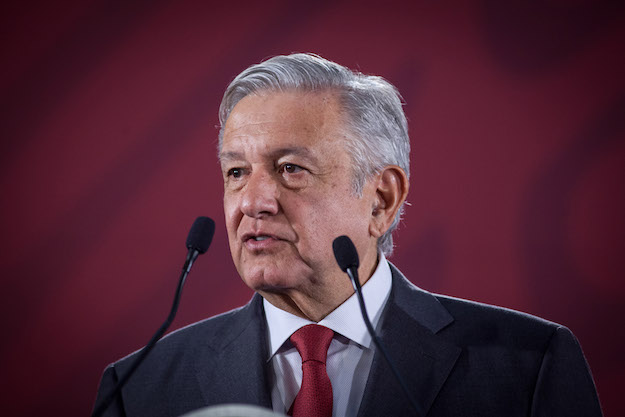There have been three transitions of party power in Mexico since the country’s return to presidential democracy in 2000.
The first two transitions, in their own ways, fell short. Vicente Fox, whose historic election victory ended over seven decades of PRI control of the presidency, failed to guide Mexico toward a more robust and equitable democracy. Enrique Peña Nieto brought the PRI back to power in 2012 – only for corruption allegations to remind voters why they had booted his party from office in the first place.
Mexico’s third transition looks more promising. In 2018, Andrés Manuel López Obrador, widely known as AMLO, won an astonishing electoral victory with his newly created Morena party: over 30 million votes and a 30% victory over his nearest rival. While not free from mistakes – as I outlined in the first part of this essay – AMLO’s astute diagnosis of Mexico’s challenges gives cause for optimism over his presidency. Here are a few reasons why I believe AMLO will leave Mexico better than he found it.
A more equal Mexico
Poverty and inequality have stymied Mexico’s progress for decades. According to the OECD, seven out of 10 Mexicans live under conditions of poverty or vulnerability. Official figures say over 50 million people in a country of around 130 million are poor.
López Obrador ran his campaign on a promise to put the poor first, and cites poverty and corruption as Mexico’s two greatest, interlinked challenges. This is an important rhetorical shift – previous presidents prioritized free trade, economic integration and modernizing infrastructure that only a small portion of the population would ever use. AMLO has forced the country to think about poverty, why it persists and what to do about it.
In concrete terms, in his first six months in office, AMLO has taken steps to reshape Mexico’s existing anti-poverty programs while launching several of his own. This has not been free of controversy. AMLO’s programs put more control over social policy in state hands, rather than with private or civil society institutions, many of which have lost funding since López Obrador took office. Critics also say his plans are opaque and lack serious evaluation processes, and are aimed at creating a new clientele of voters for AMLO’s party.
But his programs themselves are promising. Young People Building the Future, for example, would give thousands of people between 18 and 29 years old a monthly stipend of $189 alongside job training in businesses or civil society organizations. If well administered, the program could be a model for how to engage young people in the workplace and give them an opportunity for themselves and their families.
A more engaged electorate
AMLO’s daily press conferences – which begin at 7 a.m. every day and can last for two hours – offer a degree of accountability that Mexicans have never seen at the presidential level.
True, AMLO uses his bully pulpit to bully opponents and set the day’s agenda. But the effect of his constant presence, and the scrutiny that comes with it, has quickly made Mexico a more political and civically engaged society. Mexicans can now see everyday how their leaders make decisions, and Mexican journalists have an unprecedented opportunity to challenge and exchange ideas with the president.
Indeed, AMLO’s election has in many cases brought out the best in independent institutions, civil society and the media. Before the election, many of AMLO’s opponents claimed that he would turn Mexico into a “Venezuela of the North,” and that his authoritarian character would destroy Mexico’s institutions and checks and balances. But the opposite has occurred.
A newly formed collective called #Nomasderroches, for example, has launched legal challenges to AMLO’s planned construction of a new airport outside Mexico City. The National Commission for Human Rights has criticized his decision to do away with a daycare subsidy program, and called for its reinstatement – a recommendation AMLO recently said he would follow. A similar pattern is at play in the Supreme Court. AMLO’s election has shown that Mexico’s system of checks and balances can work when properly monitored by civil society and the media – the country will be better for it.
A participatory democracy
AMLO has long touted referendums as a tool to empower the public. He has already made important decisions on that basis – including the cancellation of his predecessor’s airport project in Mexico City.
AMLO’s use of public consultations so far has been poorly implemented – the referendum on his planned infrastructure projects was organized by his party, not by the independent elections authority. He seems to favor a show of hands to a rigorous inspection of the public will.
But his goal of encouraging participation in democracy is welcome, and will ultimately help build a conception of democracy that is more robust and offers more tools with which the public can get involved in decision-making. After some outcry, AMLO and members of Congress have promised to regulate the referendum process. If they make good on that pledge before the president leaves office, Mexico will benefit from the fruits of a more participatory democracy.
LGBT and women’s rights
Mexico has made great strides on women’s and LGBT rights in recent years. Thanks to decades of lobbying and protest, it is one of the few countries with full gender parity in its legislature. And while AMLO could be more vocal in his support for the feminist cause, his Cabinet is the first in Mexico’s history where roughly 50% of the secretaries are women. These include 31-year-old Luisa Alcalde, the secretary of labor and a rising political star who is in charge of the Young People Building the Future program. Olga Sánchez Cordero, a feminist campaigner and former Supreme Court justice, is in charge of the powerful department for the interior, the first woman in Mexico to be named to the post. The list goes on.
AMLO’s commitment to feminist causes will soon be tested. Mexico’s legislature is debating a bill to decriminalize abortion at the national level, a move that most of AMLO’s Cabinet supports – though he himself has said he wants the public to weigh in. A national abortion battle, in the form of a referendum, may be on the horizon. It will be hard for López Obrador not to signal his preferences.
On LGBT rights, AMLO’s Cabinet may be the most progressive in Mexico’s history. Foreign Secretary Marcelo Ebrard, for example, was a strong supporter of same sex marriages while he was mayor of Mexico City (2006-2012); AMLO himself has evolved on LGBT rights over the course of his political career, and is now a strong supporter.
I was honored to speak alongside the president when he became the first to commemorate a national day against discrimination of the LGBT community, and his government has taken steps to strengthen the LGBT cause. Mexican consulates, for example, on May 17 announced they would perform same-sex marriages. The Senate is reviewing a bill that would give same-sex couples full medical and social rights, and prohibit conversion therapy.
On HIV/AIDS, too, AMLO has demonstrated that he is willing to listen and open avenues for new models of treatment. A backlash on LGBT rights is possible, and challenges remain – more than 30 LGBT people have been killed in hate crimes since AMLO took office, according to LetraS, an advocacy organization. But the president’s administration has positioned itself as a champion for further progress.
Closer to the people
Perhaps the most important reason why I believe AMLO will leave Mexico better than he found it is in the way he has transformed people’s perception of what power is and how it should look. His leadership style, often criticized as populist, is centered on making people feel a closer personal connection to their head of state. Symbolic steps, such as selling off government airplanes and riding on commercial flights, are important in this endeavor – especially when considering the excesses and isolation of previous administrations.
Stephen Skowronek, a professor at Yale University who studies executive power in the U.S., has divided presidential leadership into four categories. One of those is the “politics of reconstruction,” and it is a rubric under which AMLO’s presidency can be considered. He is a leader who wants to reshape the political system after the collapse of an old regime. As Skowronek writes, this type of presidency “shatters the politics of the past, orchestrates the establishment of a new coalition, and enshrines its commitments as the restoration of original values.”
Mexican political life is in need of such a reset. One of the reasons behind López Obrador’s electoral success and high approval ratings is that he acknowledges that Mexico is in a deep crisis, one created by neoliberal policies and corrupt presidents who have not been able to deliver on promises to reduce the poverty, inequality, and violence that especially affects Mexico’s underserved communities.
AMLO inherited Mexico’s old problems and its new ones (like Donald Trump), but he has a combination of power, authority and legitimacy that can enable him to achieve his goals. AMLO is obsessed with his place in history, and compares himself with Benito Juárez, whose own presidency saved Mexico from becoming a surreal French colony with an Austrian emperor. AMLO may not be able to expect such a legacy – he says he wants simply to be remembered as a good president. Despite missteps, there are still reasons to believe that he will be.







